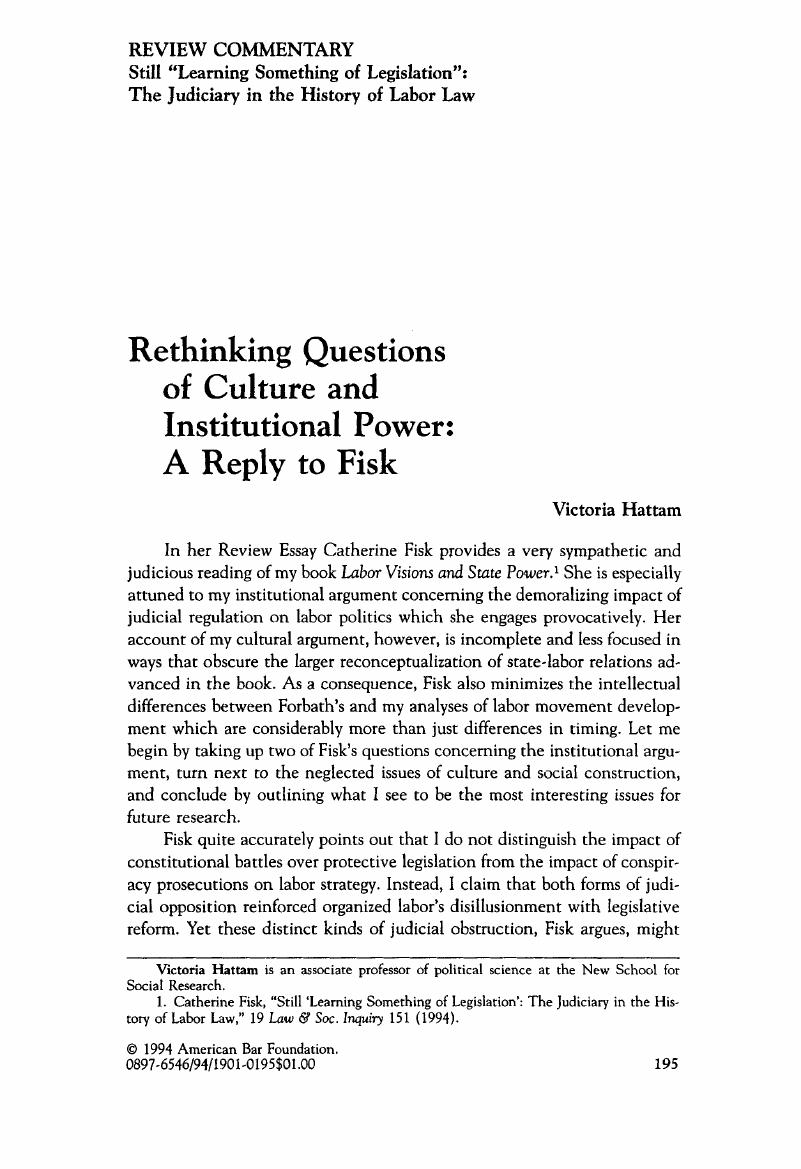No CrossRef data available.
Article contents
Rethinking Questions of Culture and Institutional Power: A Reply to Fisk
Published online by Cambridge University Press: 27 December 2018
Abstract

- Type
- Review Commentary
- Information
- Copyright
- Copyright © American Bar Foundation, 1994
References
1 Fisk, Catherine, “Still ‘Learning Something of Legislation’: The Judiciary in the History of Labor Law,” 19 Law & Soc. Inquiry 151 (1994).Google Scholar
2 Forbath's and my differences over the politicization of judicial regulation have important ramifications for our respective views of the new labor history. Our differences are captured nicely in our divergent views of David Montgomery's classic analysis of the postbellum labor movement in his Beyond Equality: Labor and the Radical Republicans, 1862–1872 (Urbana: University of Illinois Press, 1981). Forbath accepts and builds on Montgomery's account of the postwar labor movement as class conscious and united. This is the source, for Forbath, of the increased judicial obstruction of labors' legislative agenda in the 1880s and 90s. I, however, have criticized Montgomery for downplaying the internal divisions within the postwar labor movement (see at 112–22, 133–37). Moreover, it was precisely these divisions over organization, ideology, and strategy, 1 claimed, that lead to very different relations between different labor organizations and the state. By taking the standard labor history as given, Forbath misses the varied nature of state-labor relations and as a consequence reifies the nature and source of judicial power.Google Scholar
3 See William H. Sewell Jr., “A Post-Materialist Rhetoric for Labor History,” in Lenard Berlanstein, ed., Rethinking Labor History (Urbana: University of Illinois Press, 1993).Google Scholar
4 One of the benefits of adopting an identity approach to questions of working-class formation is that it brings issues of race and gender to the fore and allows us to build much needed bridges to contemporary work beyond the confines of labor history. Several scholars have already begun work along these lines. For interesting examples, see Joan Scott, Gender and the Politics of History chs. 3, 4 (New York: Columbia University Press, 1988); David R. Roediger, The Wages of Whiteness: Race and the Making of the American Working Class (New York: Verso, 1991); Sewell, “A Post-Materialist Rhetoric for Labor History” (cited in note 3); Garry Herrigel, “Identity and Institutions: The Social Construction of Trade Unions in the United States and Germany in the Nineteenth Century,” 7 Stud. Am. Pol. Dev. 2 (Fall 1993).Google Scholar
5 For elaboration of these arguments, see Victoria Hattam, “Political Identity and the Limits of the New Institutionalism” (presented at 1993 Annual Meeting of American Political Science Association, Washington Hilton, 2–5 Sept. 1993.Google Scholar




